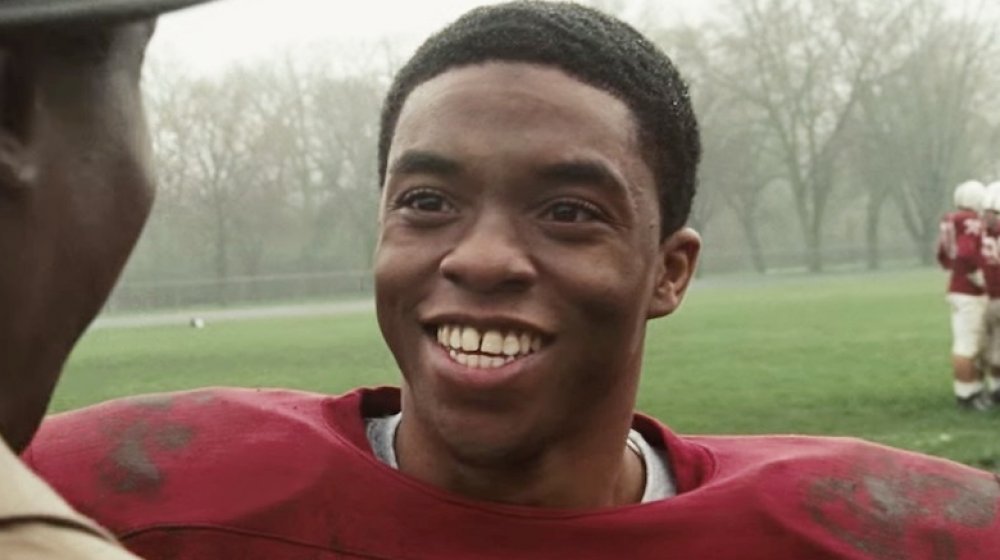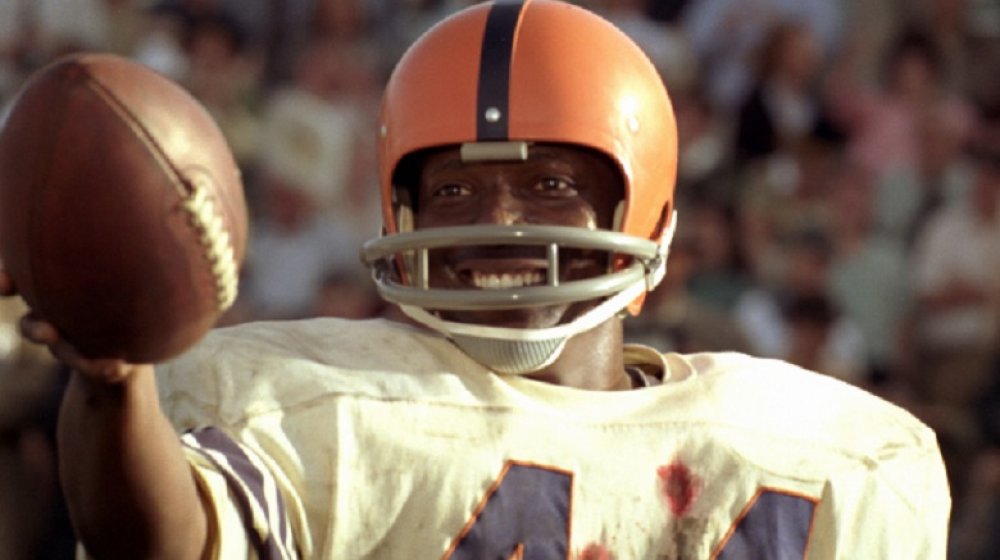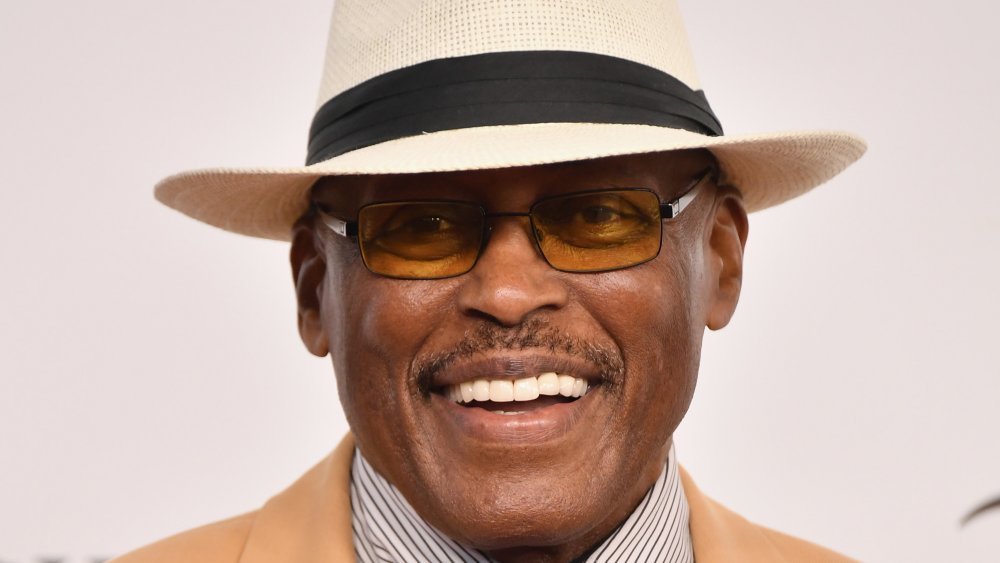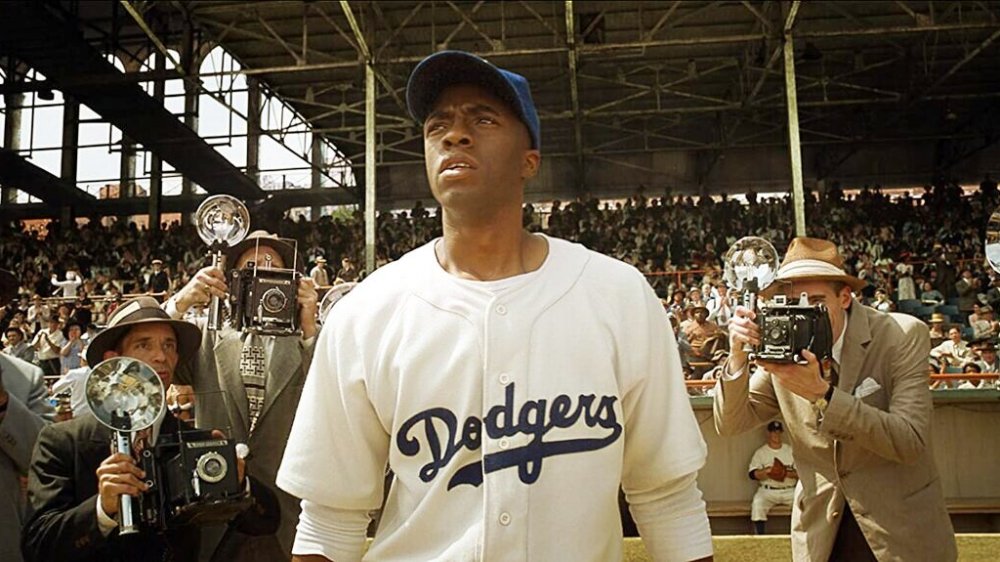The True Story Behind Chadwick Boseman's First Movie Role
Chadwick Boseman may be gone, but the stories he chose to bring to the screen are timeless — with relevant lessons to be found even in the film that gave him his very first feature role.
Boseman, best-known for his work as King T'Challa in Black Panther and three additional films for Marvel Studios, recently passed away after a secret, four-year battle with colon cancer. While his life and career were far too short, the actor made sure that the stories he helped to tell in his film appearances were the type that the world needed to hear. After establishing himself in Hollywood with bit parts on TV series such as Third Watch, Law & Order, and CSI: New York, Boseman first appeared on the big screen in 2008's The Express: The Ernie Davis Story, which chronicled the too-short life of a Syracuse football legend.
Directed by Gary Fleder, The Express starred Blindspot's Rob Brown in the title role of Ernie Davis, the first Black football player to win college ball's greatest individual prize: the Heisman Trophy. Boseman portrayed Floyd Little, Davis' fellow Syracuse running back and a football legend in his own right. In addition to Boseman, the flick's excellent supporting cast included The Intruder's Dennis Quaid, True Blood's Nelsan Ellis, Carter High's Charles S. Dutton, and Sleepy Hollow's Nicole Beharie.
The Express is the story of another talent gone too soon
Raised by his grandparents in Uniontown, Pennsylvania for most of his childhood, Davis went to live with his mother in Elmira, New York at the age of 12. There, he enrolled in Elmira Free Academy, where he proved to have stunning natural athletic gifts. He played baseball, basketball, and football, and if he hadn't chosen to focus on football, he might very well have earned a college scholarship for his skills on the basketball court. He led Elmira's hoops team to 52 consecutive wins, but his heart was on the gridiron, and he was convinced to commit to Syracuse by the program's former running back (and future NFL giant) Jim Brown, according to the book Ernie Davis: The Elmira Express, the Story of a Heisman Trophy Winner by Robert C. Gallagher.
During his sophomore season in 1959, Davis earned the moniker "the Elmira Express" while racking up ten touchdowns on 686 rushing yards. At the season's end, Syracuse took on the Texas Longhorns in the Cotton Bowl — and despite pulling a hamstring shortly before game time, Davis turned in a gutsy performance, rushing for a pair of touchdowns to cement a 23-14 win, an undefeated season, and his school's first national championship.
Davis would earn his Heisman two seasons later, and he completed his college football career having set school records in virtually every rushing category. Like Brown before him, Davis was drafted by the Cleveland Browns — but unfortunately, he would never play a professional down. Davis had been diagnosed with leukemia while preparing for his final college All-Star game, and while treatment briefly forced the disease into remission, it returned while Davis spent his first and only NFL season on the sideline. He died in May 1963, and was publicly eulogized in both the U.S. Senate and House of Representatives; his wake in Elmira drew a staggering 10,000 mourners.
All about Floyd Little, the man Chadwick Boseman played in The Express
Little's college career began just as Davis' was winding down. Davis, in fact, convinced Little to attend Syracuse, and Little followed admirably in his predecessor's nimble footsteps (via ESPN). He was a three-time All American for the Syracuse University Orangemen, and he made history in 1967 by becoming the first-ever first-round draft pick to sign with the Denver Broncos. Little was selected sixth overall that year, which happened to be the first ever joint draft conducted by the NFL and AFL, which would complete their merger in 1970.
Dubbed "the Franchise," Little spent all eight seasons of his pro career in Denver, amassing over 12,000 all-purpose yards and scoring 54 touchdowns, according to Pro Football Hall of Fame. He was selected to the Pro Bowl five times, led the NFL in rushing in 1971, and retired as the seventh-leading rusher in NFL history overall. Little was a shoo-in for inclusion in the Broncos' Ring of Fame, and in 2010, he was selected to the Pro Football Hall of Fame alongside greats like Emmitt Smith, Jerry Rice, and John Randle.
Unfortunately, it was made public earlier in 2020 that Little himself is battling a rare form of cell cancer (via 9News).
While Little has yet to comment publicly on Boseman's passing as of this writing, the Denver Broncos organization issued a brief statement via its official Twitter account. "You played Floyd Little in The Express like all your roles — with grace and passion," the statement reads. "Rest in peace, @chadwickboseman."
The Express was an early example of Chadwick Boseman's commitment to playing strong Black historical figures
Looking back over Boseman's career, it's easy to see how The Express was the beginning of what would be a career-long commitment to telling the stories of strong historical figures who made profound differences in the Black community and the world at large. After starring in the film, Boseman returned to television for four years, starred in 2012's The Kill Hole, and then landed another gig portraying an important Black icon.
In 2013's 42, Boseman starred as Jackie Robinson, the player who annihilated baseball's color barrier by signing with the Brooklyn Dodgers in 1947, becoming the first Black man to play in the major leagues. Boseman's performance was widely acclaimed — and those impressed by his embodiment of Robinson's quiet dignity were further astounded when, for his next major movie role, Boseman proved equally adept at embodying the larger-than-life personality of the Godfather of Soul, James Brown, in the 2014 biopic Get on Up.
Boseman would go on to do similarly exemplary work in the 2017 biopic Marshall, which chronicled the early years of Supreme Court Justice Thurgood Marshall, the first Black man to sit on the nation's highest court. Boseman may forever be associated with King T'Challa, the Black Panther, in the eyes of many fans — but in his all-too-brief life and career, he proved that there were few actors more capable of giving cinematic life to some of the most important figures of the 20th century.



